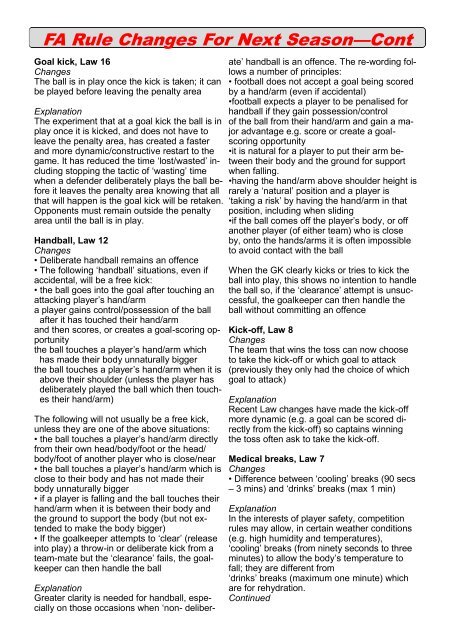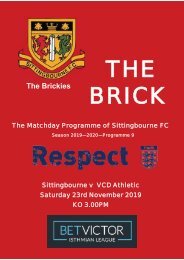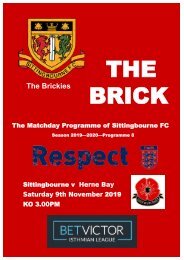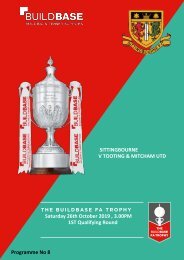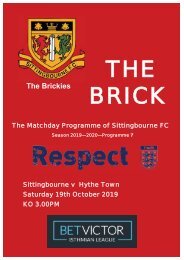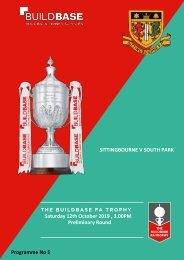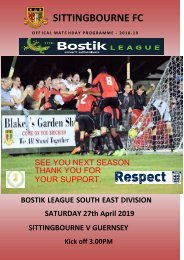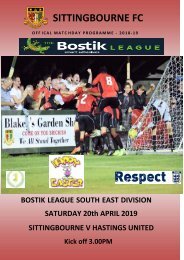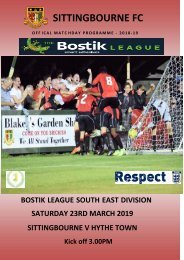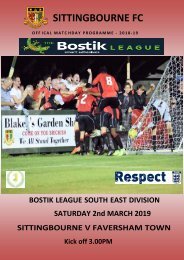Match Day Programme Sittingbourne v Horsham 6th April 2019
Match Day Programme Sittingbourne v Horsham 6th April 2019
Match Day Programme Sittingbourne v Horsham 6th April 2019
Create successful ePaper yourself
Turn your PDF publications into a flip-book with our unique Google optimized e-Paper software.
FA Rule Changes For Next Season—Cont<br />
Goal kick, Law 16<br />
Changes<br />
The ball is in play once the kick is taken; it can<br />
be played before leaving the penalty area<br />
Explanation<br />
The experiment that at a goal kick the ball is in<br />
play once it is kicked, and does not have to<br />
leave the penalty area, has created a faster<br />
and more dynamic/constructive restart to the<br />
game. It has reduced the time ‘lost/wasted’ including<br />
stopping the tactic of ‘wasting’ time<br />
when a defender deliberately plays the ball before<br />
it leaves the penalty area knowing that all<br />
that will happen is the goal kick will be retaken.<br />
Opponents must remain outside the penalty<br />
area until the ball is in play.<br />
Handball, Law 12<br />
Changes<br />
• Deliberate handball remains an offence<br />
• The following ‘handball’ situations, even if<br />
accidental, will be a free kick:<br />
• the ball goes into the goal after touching an<br />
attacking player’s hand/arm<br />
a player gains control/possession of the ball<br />
after it has touched their hand/arm<br />
and then scores, or creates a goal-scoring opportunity<br />
the ball touches a player’s hand/arm which<br />
has made their body unnaturally bigger<br />
the ball touches a player’s hand/arm when it is<br />
above their shoulder (unless the player has<br />
deliberately played the ball which then touches<br />
their hand/arm)<br />
The following will not usually be a free kick,<br />
unless they are one of the above situations:<br />
• the ball touches a player’s hand/arm directly<br />
from their own head/body/foot or the head/<br />
body/foot of another player who is close/near<br />
• the ball touches a player’s hand/arm which is<br />
close to their body and has not made their<br />
body unnaturally bigger<br />
• if a player is falling and the ball touches their<br />
hand/arm when it is between their body and<br />
the ground to support the body (but not extended<br />
to make the body bigger)<br />
• If the goalkeeper attempts to ‘clear’ (release<br />
into play) a throw-in or deliberate kick from a<br />
team-mate but the ‘clearance’ fails, the goalkeeper<br />
can then handle the ball<br />
Explanation<br />
Greater clarity is needed for handball, especially<br />
on those occasions when ‘non- deliberate’<br />
handball is an offence. The re-wording follows<br />
a number of principles:<br />
• football does not accept a goal being scored<br />
by a hand/arm (even if accidental)<br />
•football expects a player to be penalised for<br />
handball if they gain possession/control<br />
of the ball from their hand/arm and gain a major<br />
advantage e.g. score or create a goalscoring<br />
opportunity<br />
•it is natural for a player to put their arm between<br />
their body and the ground for support<br />
when falling.<br />
•having the hand/arm above shoulder height is<br />
rarely a ‘natural’ position and a player is<br />
‘taking a risk’ by having the hand/arm in that<br />
position, including when sliding<br />
•if the ball comes off the player’s body, or off<br />
another player (of either team) who is close<br />
by, onto the hands/arms it is often impossible<br />
to avoid contact with the ball<br />
When the GK clearly kicks or tries to kick the<br />
ball into play, this shows no intention to handle<br />
the ball so, if the ‘clearance’ attempt is unsuccessful,<br />
the goalkeeper can then handle the<br />
ball without committing an offence<br />
Kick-off, Law 8<br />
Changes<br />
The team that wins the toss can now choose<br />
to take the kick-off or which goal to attack<br />
(previously they only had the choice of which<br />
goal to attack)<br />
Explanation<br />
Recent Law changes have made the kick-off<br />
more dynamic (e.g. a goal can be scored directly<br />
from the kick-off) so captains winning<br />
the toss often ask to take the kick-off.<br />
Medical breaks, Law 7<br />
Changes<br />
• Difference between ‘cooling’ breaks (90 secs<br />
– 3 mins) and ‘drinks’ breaks (max 1 min)<br />
Explanation<br />
In the interests of player safety, competition<br />
rules may allow, in certain weather conditions<br />
(e.g. high humidity and temperatures),<br />
‘cooling’ breaks (from ninety seconds to three<br />
minutes) to allow the body’s temperature to<br />
fall; they are different from<br />
‘drinks’ breaks (maximum one minute) which<br />
are for rehydration.<br />
Continued


